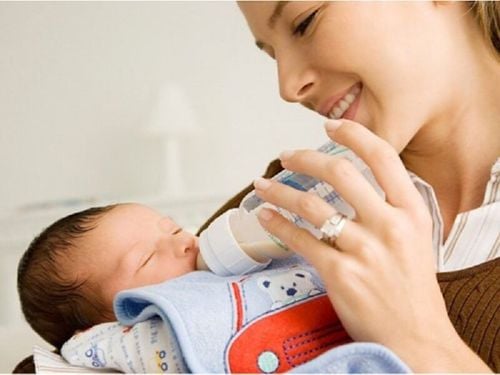This is an automatically translated article.
Every child develops at his or her own pace and there are many instances where it is considered slower than normal. While the road ahead will be easy and parents constantly worry about "what to do with mentally retarded children," there are ways parents can help support their children at home, giving them the best chance of getting started. keep up with the development somewhat like friends of the same age.
1. What is a child with mental retardation?
“Development delay” is a general term used for children who are behind expected milestones for their age, including:
Motor skills Know how to communicate, use words speaking, language Understanding and learning Behavioral control Using social skills and interacting with others. A child with a mental retardation may have problems with one of these problems or multiple problems at the same time. Some cases of developmental delay are temporary; If children receive active support and interventions, they can achieve their developmental milestones as well as continue to catch up with their peers.
In some other children, however, the language delay may continue for much longer. This may be the first sign of a complex long-term illness or problem for which the child may need specialized intervention, treatment or support, sometimes requiring a strong network of connections between the two. school, family and society.
Therefore, the most important thing is to get your child checked early. Research shows that raising children with love, detecting early signs of suspected intellectual and language retardation for early treatment and creating appropriate learning opportunities for children can create makes a huge difference to how children develop in the long run.

"Trẻ chậm phát triển trí tuệ phải làm sao?" luôn là vấn đề mà các mẹ không ngừng lo lắng
2. Causes of children's mental and language retardation
Although there are many different causes of mere physical retardation, for the intelligence and language of young children, there are many specific causes or related factors that are never known . These effects can occur during pregnancy, around the time of birth, or in the environment in which the child grows up. Some causes include:
Genetic conditions Birth too early (premature birth) Birth trauma or other obstetric complications at birth Hearing defects such as congenital deafness or vision Many medical conditions requiring admission Long-term hospitalization causes children to miss the opportunity to learn and develop normally. Malnutrition Genetic diseases and metabolic disorders such as congenital hypothyroidism; Family stress or neglect can leave children without care. fully loving care during childhood Pregnant mothers are exposed to certain drugs and stimulants before birth, eg alcohol, tranquilizers.
3. Children with delayed intellectual and language development, what to do?
Take your child to see a doctor Parents are always the ones who know their child best. If there are concerns about the child's intellectual and language development at any time, especially in children with one of the above suspect factors, it is important to bring the child to the doctor's office. paediatrician or child development specialist to check and advise on the child's condition and adjustments if necessary.
Ways to support your child at home For children who have been identified as having a mental retardation, health professionals or educators will provide advice on what parents can do at home to help their child. best development. It is important to follow their advice patiently and to assess the child's results and progress.
Some simple things to help improve children's mental and language retardation are:
Always talk to your child from birth. Make eye contact, smile, and use simple words. Talk even when the parents are doing things to take care of the child. Talk about what has happened, is happening as well as what will happen next, good wishes in the future. The more parents talk to their children, the more they learn that sounds make up words and that words have meaning. Over time, these repeated actions will form a reflex, thereby helping children learn language and talk to the opposite person, expressing their wishes.
Listen, observe the baby's small sounds or simple spontaneous movements and copy them. This is the beginning of learning to speak or playing small imitation games, such as when they say “e e”, stick out their tongue, which parents can repeat for the child.
Read together with babies, toddlers and young children for a few minutes a day - it's never too early to start. This is a time for children to have a chance to be close, to listen to their parents' voices and to know that a treasure trove of books is interesting. Besides, children also love songs or rhyming verses.

Đọc sách là một trong các cách giúp cải thiện tình trạng trẻ chậm phát triển ngôn ngữ tại nhà
Some children have characteristics that do not require much attention and do not cry a lot, they play with themselves for a very long time. Even though they're good babysitters, parents also need to spend a lot of time building a bond with their baby, by stroking, hugging, and responding to small cues. The relationship parents have with their children is one of the most important foundations for children to develop social skills in the future.
Besides, children learn everything in the world around them from playing, exploring and experimenting. Therefore, to help children's intellectual development, parents can:
Give babies lots of brightly colored, playful sounds to look at, touch, shake or hold. Take your children out for walks often. Let your child see, feel, and hear a variety of things.
Make sure your child has plenty of things to play with and places to explore when he or she begins to move around like crawling, walking - this can be done without expensive toys. Pay attention to things your child is interested in and keep an eye on them to make sure nothing harms them.
Give your child time to try things on his own but help him before he gets too frustrated. If a child is working very hard to achieve something, parents can bring it a little closer, so that the child has a chance to achieve it and feel successful. Accordingly, it is advisable to create conditions for children to achieve many opportunities to succeed. Even very small successes can make children feel they have control over their lives and this builds self-esteem and independence. A child who has failed repeatedly is likely to avoid trying, become passive, and slow to develop other skills.
Should give lots of praise for small successes of children or encourage and encourage children when they do one part right and then guide them in the next parts. Don't wait until your child has done the entire task correctly because sometimes children can get lost, giving up halfway.
Create opportunities for children to experiment and follow their interests in finding what they want to do. Most kids can take care of pets, cook, garden, or fish. Help your child find groups or clubs with similar interests that give them the opportunity to do better.
Don't always force your child to practice new things and accept it if he or she doesn't do well the first few times
Let your child help his or her peers, even if he's barely done it yet good everything. A child with a developmental delay continues to learn, but helping another child is also an opportunity for a child to learn better.
Because mentally retarded children may take longer to learn new skills and need more opportunities for ongoing practice, parents or caregivers can help divide new skills into Take small steps for children to practice each part before they can complete it.
In children with developmental delays, caring for and raising children is a journey, not a race. Accordingly, most children are satisfied with what they achieve on their own, although it is slower than their age, but if children receive the message that their parents always love and are proud of them, they will not stop improvement.
In summary, most parents will feel hurt if their child's development is less than that of children of the same age or is diagnosed as a child with a developmental delay, a disability or learning difficulties. Some people may be shocked, grieving, angry, or constantly wondering “can retardation be cured?” but it is important to ask yourself if this attitude will change the future of your child with mental retardation. wisdom if not start trying to adjust today. In addition, to help children develop intellectually and physically, in addition to the nutritional regime, parents should supplement their children with supportive products containing lysine, essential micro-minerals and vitamins such as zinc, chromium, selenium, vitamin B group helps to fully meet the nutritional needs of children. At the same time, these essential vitamins also support digestion, enhance nutrient absorption, help improve anorexia, help children eat well, and develop comprehensively.
Please regularly visit Vinmec.com website and update useful information to take care of your baby and family.













